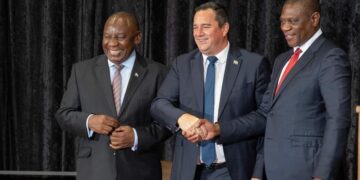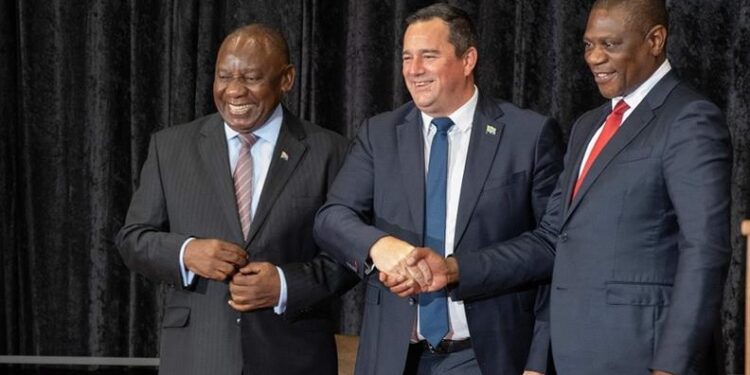By John Ikani
South Africa’s unity government, led by President Cyril Ramaphosa, was inaugurated on Wednesday, marking a significant shift after 30 years under the ANC.
During a televised event in Cape Town, Paul Mashatile, reappointed as deputy president, took the first oath, followed by 32 ministers from six different parties.
Ramaphosa, 71, introduced his coalition government on Sunday, which includes the head of the former main opposition party. The number of ministries has increased from 30 to 32, with 43 deputy ministers appointed.
The ANC, in power since 1994, aimed for a national unity government after losing its outright majority in the May 29 elections.
Winning just over 40 percent of the vote, the ANC retains 20 cabinet positions, covering areas such as foreign affairs, finance, defense, justice, and police.
The Democratic Alliance (DA), the largest coalition partner and a longtime critic of the ANC, secured 21.8 percent of the vote and will lead six ministries, including agriculture, public works, and communication.
John Steenhuisen, 48, the DA leader, has been appointed agriculture minister.
The DA has consistently criticized the ANC for high violent crime rates, a sluggish economy, and a severe energy crisis.
The Zulu nationalist Inkatha Freedom Party, the anti-immigration Patriotic Alliance, the right-wing Freedom Front Plus, and other smaller parties will share six cabinet positions.
The new cabinet includes 14 female ministers and 18 female deputy ministers.
This government represents a move towards the center-right, sparking hopes for improved governance but also concerns about unity.
US President Joe Biden called Ramaphosa on Tuesday “to congratulate him on his recent election and the successful formation of the government of national unity,” according to the presidency.
Ramaphosa has faced criticism over the number of ministers, with concerns about potential government inefficiency and taxpayer costs.
Ministers earn over 2.5 million rand ($135,000) annually, while deputy ministers receive more than 2.2 million rand ($119,000), as noted in the government gazette.
Their perks include state security, travel allowances, and homes in Cape Town and Pretoria, the administrative capital.
The opposition Economic Freedom Fighters expressed concern “that this cabinet has been increased and bloated, signaling more pressure on taxpayers.”




































